Host Turns Guests Away After A Long Flight Because They Came With Dogs
ThreeHoursAway, a Reddit user, posted on the "AITA" subreddit about an incident that occurred during Christmas. He had invited an old friend to spend the holiday with him since he had extra space, and the friend's plans had fallen through.
The friend asked if he could bring his whole family, to which ThreeHoursAway agreed, thinking that the family consisted of a wife and two kids. However, when the friend and his family arrived, they brought two dogs with them, which ThreeHoursAway was not expecting and was not comfortable with.
His wife is not a dog person, and he is not familiar with the dogs' training. ThreeHoursAway asked why the friend did not mention the dogs, and the friend said he had indicated he was bringing the whole family, and ThreeHoursAway should have known he had two dogs.
ThreeHoursAway apologized and said the dogs could not stay in his house. The friend and his family were furious, calling ThreeHoursAway an a-hole and a moron, and accusing him of ruining their holiday.
ThreeHoursAway reached out to the friend after 24 hours, hoping to discuss and make amends, but he hasn't heard back from him. He is feeling bad about the situation and is asking for an outside perspective on whether or not he was in the wrong.
Here's what the AITA community thinks about the incident.
Here's OP's story.
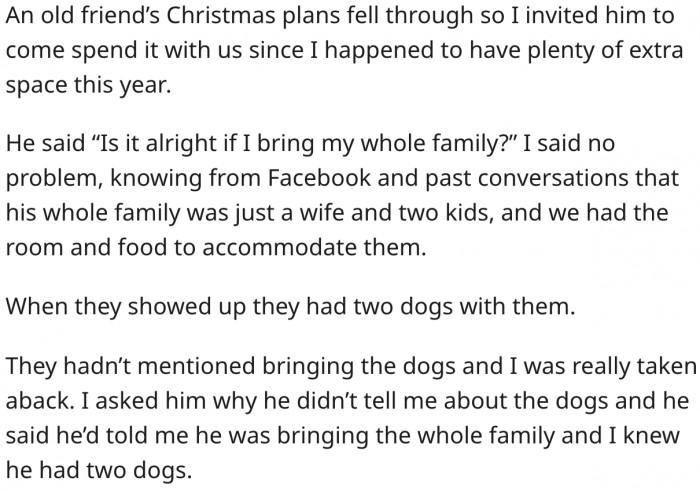
He turned them down for bringing their dogs along.
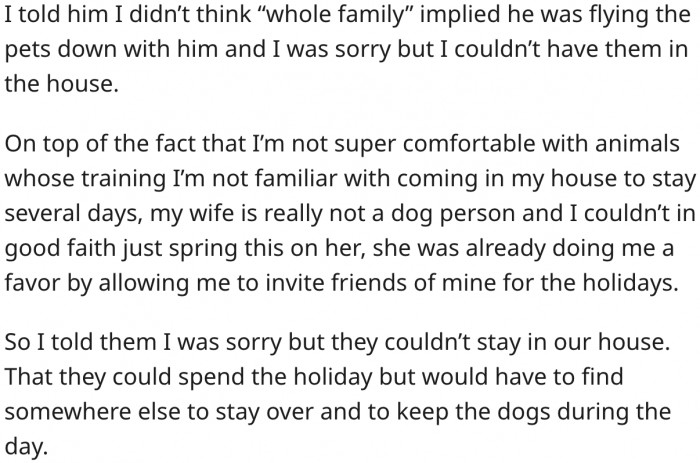
Was he wrong to do that? Reddit responds.

Understanding Host-Guest Relationships
This situation highlights the complexities of host-guest relationships, particularly when pets are involved. Research indicates that pets can evoke strong emotional responses, and their presence can significantly influence social interactions.
According to studies published in the Journal of Social Psychology, hosts may have valid concerns regarding the comfort and safety of their guests, which can impact their decisions about pet policies.
Understanding Host-Guest Dynamics
Dr. Michael Green, a social psychologist at Harvard, explores the complexities of host-guest relationships.
His research indicates that hosts often have implicit expectations about their guests' behaviors, which can lead to conflict if those expectations are not met.
When guests bring pets, it can challenge the host's comfort levels and personal boundaries, creating tension.
1. His friend intentionally didn't mention the dogs so that he wouldn't object.
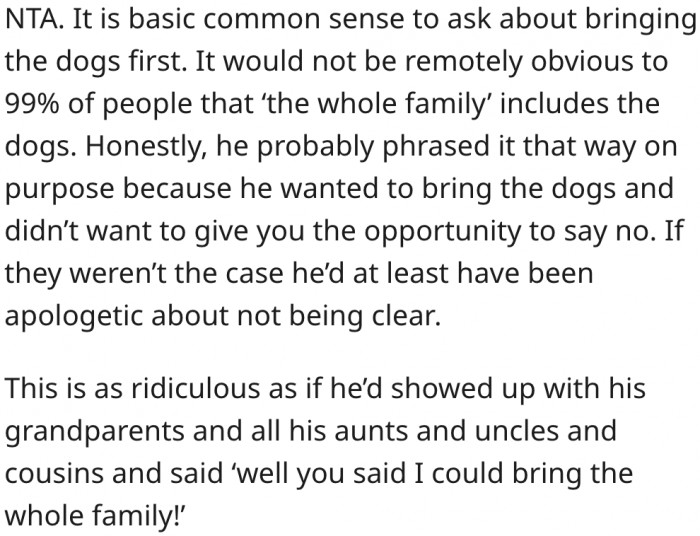
2. There are several reasons why visiting with a pet can inconvenience a host.

3. His friend wanted to pull a fast one on him.
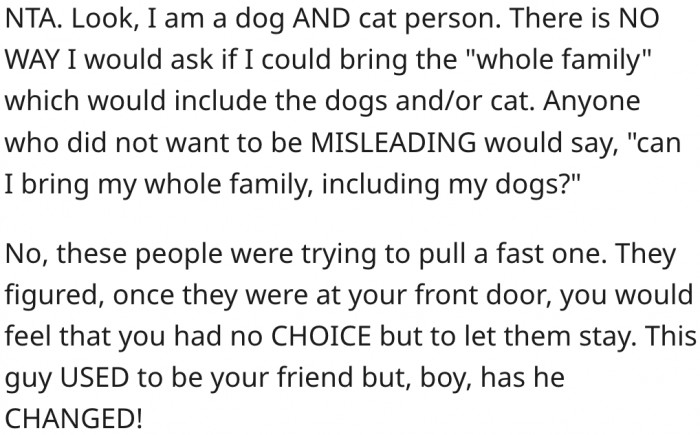
Moreover, the concept of personal space and boundaries plays a critical role in these dynamics. A study by Dr. John Bowlby on attachment theory suggests that people have varying thresholds for comfort regarding personal space, which can lead to misunderstandings between hosts and guests.
In this case, the host's decision to deny entry to the dogs reflects a need to maintain personal comfort levels within their home.
Guests may feel entitled to bring their pets based on their personal connections to their animals, leading to misunderstandings.
Studies in the Journal of Social Psychology show that perceptions of entitlement can significantly influence interpersonal interactions.
Hosts may interpret guests' actions as dismissive of their preferences, which can escalate conflicts.
4. Pets are not considered among family members.

5. Courtesy demands that you get a host's permission before visiting with pets.

6. His friend was trying to manipulate him.
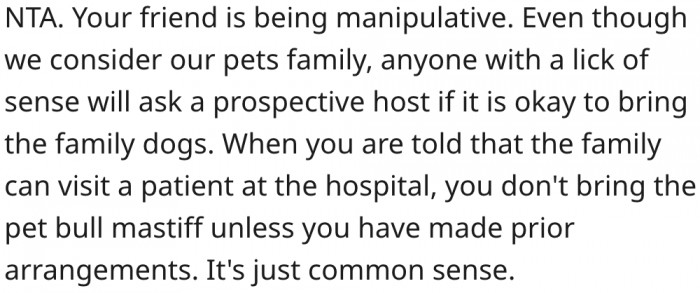
The Role of Communication in Social Settings
Effective communication is essential in resolving conflicts related to pet policies. Research indicates that clear expectations can prevent misunderstandings and foster positive interactions among guests and hosts.
Utilizing open dialogues about expectations for social gatherings can lead to more satisfying experiences for all involved.
The Importance of Communication in Hosting
Effective communication is essential for navigating host-guest relationships.
Research indicates that hosts who clearly articulate their preferences can set the tone for a positive visit.
Encouraging guests to discuss their plans before arriving can help prevent misunderstandings and foster a more harmonious atmosphere.
7. Pets are family, but you shouldn't take them to places without permission.

8. Humans are family, not pets.

9. Dogs are a different kind of family member.
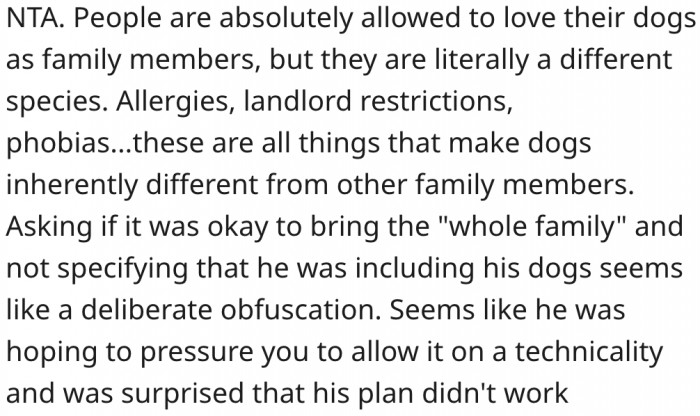
Additionally, it may be beneficial for hosts to consider compromise solutions. For example, setting specific areas for pets or designating pet-free zones can help accommodate both guests and their furry companions.
Research supports that collaborative problem-solving can lead to mutually beneficial outcomes.
Setting clear guidelines about pets can also help mitigate tensions.
Hosts can communicate their preferences regarding pets in advance, allowing guests to make informed decisions.
This proactive approach can help create mutual respect and understanding between hosts and guests.
10. He knew he'd turn him down if he mentioned the dog.

11. The dogs were the most important information his friend should have mentioned first.

12. His friend ruined Christmas for his family.

Navigating Host Responsibilities
It's also important for hosts to weigh their responsibilities toward their guests. Understanding that some guests may feel anxious around pets can prompt hosts to create environments that prioritize comfort and inclusivity. According to Dr. Michele Gelfand, a cultural psychologist, "Creating inclusive spaces is essential for fostering positive interactions among diverse groups." She emphasizes that "when individuals feel safe and respected, it enhances their overall experience." This aligns with the notion that inclusivity in social settings can improve overall group dynamics and satisfaction.
Finding Balance in Hosting
Hosts and guests must find a balance that respects both parties' needs.
Research from the Journal of Family Psychology emphasizes that collaborative problem-solving can enhance relationships between hosts and guests.
By working together to find compromises, both parties can enjoy a more positive experience.
13. It makes no sense to visit someone with two dogs without permission.

14. Dogs should be mentioned separately, even though they are considered family.
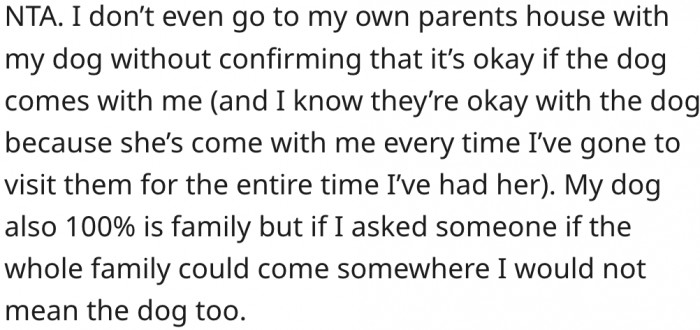
15. He did the right thing by not tolerating his friend's rudeness.
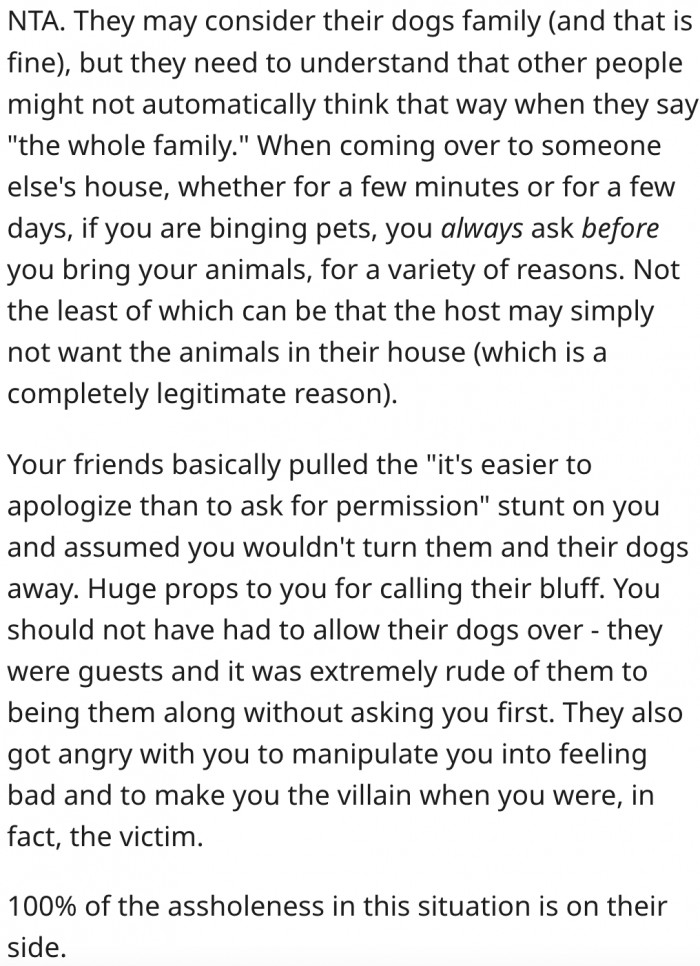
Ultimately, addressing pet policies requires sensitivity and understanding from both hosts and guests. The host should consider the feelings of their friends and balance them with their own comfort levels.
Encouraging guests to communicate their needs openly can also lead to a more harmonious gathering.
Ultimately, fostering understanding and flexibility can lead to more successful hosting experiences.
Encouraging open dialogues about expectations can prevent conflicts and promote a sense of community.
By prioritizing empathy and respect, hosts can create environments that feel welcoming for all.
16. His friend was the a-hole.
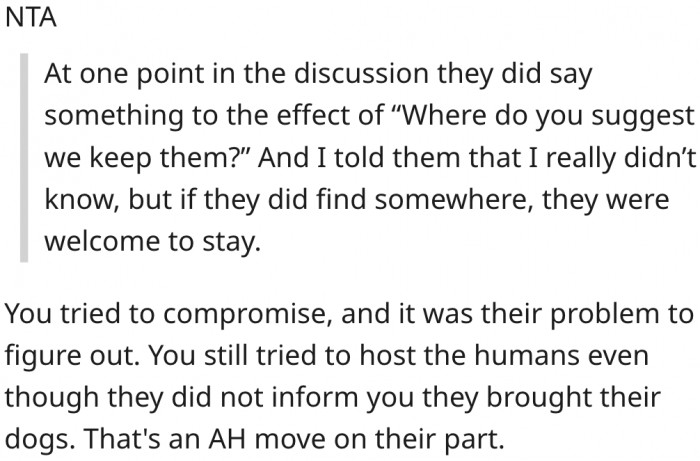
17. His wife's feelings matter the most.

18. Dogs are not welcomed everywhere.

19. You shouldn't expect everyone to treat your pet as family.

20. His friend is entitled to his beliefs, but they are different from the norms.
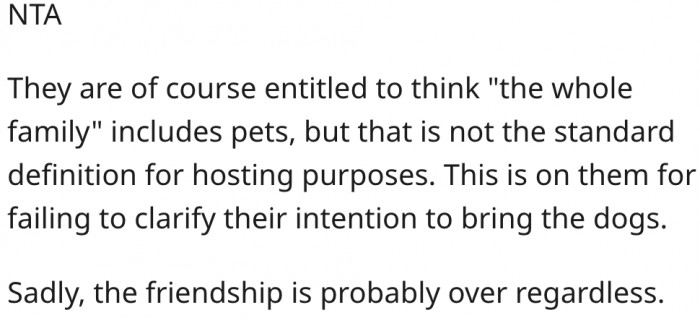
What do you think?
It is important to seek a host's permission before visiting with pets because not everyone is comfortable with animals in their home. Some people may have allergies or phobias, and others may simply prefer not to have pets in their living space.
By seeking permission in advance, you are considering the host's feelings and ensuring that everyone is comfortable with the arrangements. What do you think?
Psychological Analysis
This situation highlights the complexities of hosting and the importance of clear communication regarding expectations. It's essential for both hosts and guests to feel their preferences are respected to foster positive interactions.
Encouraging open discussions about the presence of pets can help mitigate potential conflicts and enhance the overall experience for everyone involved.
Analysis generated by AI
Analysis & Alternative Approaches
Understanding host-guest dynamics is crucial for fostering positive relationships.
Research consistently supports the importance of communication and flexibility in preventing conflicts.
By encouraging open dialogue, both hosts and guests can enhance their interactions and create a more enjoyable atmosphere.
Analysis & Alternative Approaches
In conclusion, navigating host-guest relationships requires open communication and understanding, especially when pets are involved. Research emphasizes the importance of establishing clear expectations to foster positive interactions. Ultimately, creating an accommodating environment can lead to more enjoyable social experiences.



